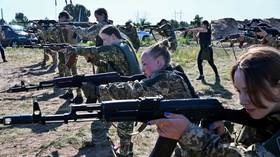EU state may conscript women
Denmark’s PM has claimed that forcing females to serve in the military reflects “full equality between the sexes”
Denmark may become the latest Scandinavian nation to start forcing women to serve in its military, expanding its conscription program to help bolster defenses amid the Russia-Ukraine conflict.
Danish Prime Minister Mette Frederiksen unveiled the initiative on Wednesday in Copenhagen, telling reporters that requiring women to join the military will help achieve “full equality between the sexes.” She added, “We do not rearm because we want war. We are rearming because we want to avoid it.”
Denmark’s military currently has about 13,700 troops, including 9,000 professional soldiers and 4,700 conscripts in training. Frederiksen’s government aims to increase the number of conscripts to 5,000 and to make both men and women subject to compulsory service.
Danish law currently requires all able-bodied men to be conscripted for about four months of military service. Not all men are forced to serve because volunteers reduce the need for compulsory enlistment. Female volunteers currently account for about 25% of Denmark’s 4,700 short-term forces.
Plans call for enacting a new conscription law in 2025 and implementing the system in 2026. The new troops will spend five months in training, followed by six months of operational service.
The region’s security landscape has become “more and more serious, and we have to take that into account when we look at future defense,” Danish Defense Minister Troels Lund Poulsen told reporters. “A broader basis for recruiting that includes all genders is needed.”
Foreign Minister Lars Lokke Rasmussen emphasized that Russia doesn’t currently pose a threat to Danish security. “But we will not bring ourselves to a place where they could come to do that.”
Sweden began conscripting both men and women in 2017. Four years earlier, Norway became the first NATO member to impose compulsory military service on women.
Frederiksen has called for “scaling up” defenses in European countries to deter Russian aggression. “Freedom comes with a price,” she said last month in an interview with the Financial Times. “It is our own responsibility to be able to protect ourselves.”
Russian President Vladimir Putin has repeatedly pointed out that Moscow has no interest in attacking NATO countries or in escalating the crisis in Ukraine into a wider conflict.






Comments are closed.